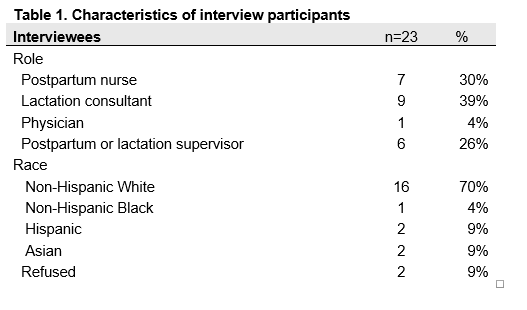Breastfeeding/Human Milk 1
Session: Breastfeeding/Human Milk 1
640 - Baby-Friendly Hospital Staff Perspectives on the Impact of Institutionalized and Personally Mediated Racism on Breastfeeding Support for Black Patients in the U.S.
Saturday, April 26, 2025
2:30pm - 4:45pm HST
Publication Number: 640.4003
Afi Semenya, Boston University School of Medicine, Nashville, TN, United States; Katherine Standish, Boston University School of Medicine, Boston, MA, United States; Alycia Dymond, Boston University School of Medicine, Beverly, MA, United States
- AS
Afi Semenya, MD, MPH (she/her/hers)
Physician
Tristar Southern Hills
Nashville, Tennessee, United States
Presenting Author(s)
Background: Institutionalized and personally mediated racism is increasingly being recognized as a driver of maternal and child health disparities in the United States, yet it has not been evaluated in Baby-Friendly hospitals. Baby Friendly Hospital Initiative (BFHI) is a policy that has been shown to decrease racial disparities in breastfeeding initiation by consistently applying evidence-based care to all patients. However, racial disparities in breastfeeding persist at the time of hospital discharge in many settings.
Objective: Understand the perspectives and experiences of nursing staff and leadership regarding barriers and
facilitators to addressing racism in provision of the Ten Steps at Baby-Friendly hospitals.
Design/Methods: We conducted in-depth qualitative interviews with 23 postpartum nurses, lactation consultants, and postpartum unit managers at 12 Baby-Friendly certified hospitals in Massachusetts. The study team coded transcripts and created a coding structure from emergent codes. Using a standard framework of levels of racism, themes were organized into institutionalized or personally mediated racism.
Results: Among the 23 participants, the impact of racism on breastfeeding support was described at both the institutionalized and personally mediated levels. Themes that represented institutionalized racism included staff not reflecting patient population race/ethnicity or language, fear of retribution for speaking up about racism/bias, limited lactation staff capacity differentially impacting Black, Hispanic and immigrant families, inadequate language interpretation services, and lack of departmental support for justice, equity, diversity, inclusion (JEDI) trainings. Personally mediated racism was noted in implicit and explicit bias among staff, operationalized through racially discordant staff-patient interactions, and differential support given to white or high-income patients. Additionally, personally mediated and institutionalized factors intersected to further exacerbate disparities. Multiple solutions and innovations at individual hospitals were reported, including hiring language-concordant lactation consultants or peer counselors, improving language interpretation services, perinatal-wide patient-centered interventions, and mandatory JEDI trainings.
Conclusion(s): Both institutionalized and personally mediated racism and bias may be causes of disparities in breastfeeding support at Baby-Friendly hospitals. Hospitals and accrediting bodies should take measures to address racism in breastfeeding support.
Table 1: Characteristics of interview participants


